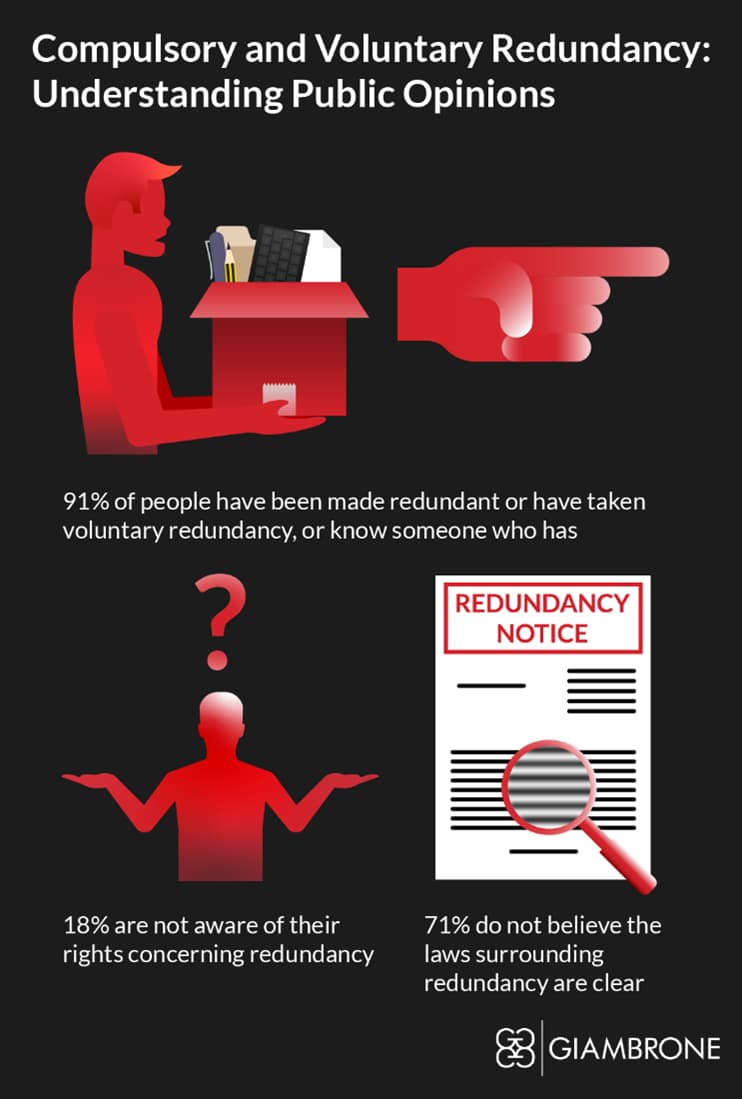x
Our website uses cookies. By continuing to use the site, you agree to our use of these cookies. To learn more about how we use the cookies and how you can manage them, please see our cookies policy.
Being made redundant, or facing the threat of redundancy, is nearly always an uncertain and stressful time. Following our 2024 study, 91% of people either have been made redundant or have taken voluntary redundancy, or know someone who has. Often, compulsory redundancy is unavoidable; companies make employees redundant for various reasons such as, if the business is failing, your skills are no longer needed, or your work is being done by others following a reorganisation within the business. You can also take voluntary redundancy if your company has asked for volunteers. However, there are instances where making an employee redundant is unlawful, if this the case, you should consider seeking legal advice.
In this guide, we will explore the rise of redundancy, your rights concerning compulsory and voluntary redundancy, and the steps you can take if you are made redundant. We will also explore what you can do if you need to take legal action, and how our lawyers at Giambrone and Partners can help.
Click on the links below to each section:
Discover why the number of people being made redundant is rising
Some people are unaware of their rights concerning redundancy, which can lead to legal issues down the road
Here’s how you can navigate redundancy, whether it is voluntary or compulsory
Sometimes, redundancy can become contentious; here’s when you should seek legal advice
How we can assist
There are various reasons why redundancy is higher in certain years when compared to others. Redundancies have risen in the past year, although they are still lower than during the pandemic. The threat of redundancy and uncertainty around job security has risen too; in our 2024 survey, 53% of people have been affected by redundancy, but have ultimately kept their jobs.
Redundancies are expected to rise again leaving businesses with no choice but to make some tough decisions. The largest age group in our survey who have experienced redundancy are 65+ but 43% of 25-34 people who took the survey have been made redundant or taken voluntary redundancy, showing that lack of job security spreads through all demographics.
Rising costs and other financial factors often drives the need for businesses to downsize, or face closure altogether. Employees often suffer during financial uncertainty, and most of the time, the redundancies are completely legal. However, you can take legal action if you believe you have been wrongfully made redundant.
Knowing your rights when it comes to redundancy is extremely important; in our recent survey, 18% of respondents were not aware of their rights concerning redundancy, and 71% do not believe the laws surrounding redundancy are clear.
When being made redundant, your employer should inform you as to what is happening and ask you if you have any questions concerning redundancy. Employers must look at the different ways to avoid redundancies, and consider alternatives. Depending on the size of the company, your employer can consult with you individually or as a group. You are entitled to paid time off to seek another job if you have worked within the business continuously for two years or more.
There are several benefits you may be eligible for, such as redundancy pay, a notice period, and the option to move to another job. You must also be selected for redundancy in an objective way, such as whether you have recently joined the business (last in, first out), you may volunteer for redundancy (your employer may also ask for volunteers), your disciplinary record and your qualifications and experience can be considered.
Selecting someone for redundancy based on certain factors directly related to the individual can be seen as unfair dismissal. These reasons include making someone redundant based on:
If you believe you have been made redundant based on the above criteria, you may be able to take legal action against your employer. Consult our employment lawyers today to discuss your redundancy case.

If you have recently been made redundant, if you have worked for your employer for at least two years, you can apply for redundancy pay, holiday pay, any money owed to you by your employer, and statutory notice pay. You can apply online. Your applications will then be processed by the Department of Work and Pensions.
It is also advised that you apply for employment-related benefits, such as Universal Credit and Job Seeker’s Allowance.
You can should seek legal advice if you believe you your redundancy was unlawful.
You should seek legal action against your employer if you believe that you have been made redundant unlawfully. In our 2024 survey, 40% of respondents were only partially aware of the reasons an employer could make them redundant, but 13% were not aware at all.
If you have any reason to believe your employer discriminated against you when making the decision to make you redundant, you should gather all necessary evidence before making a claim. You can also take legal action against an employer if you were not informed of your redundancy beforehand, or if you have not been given a fair settlement. If you are unsure of your position, you should seek advice from Giambrone and Partners’ experience employment lawyers who will be able to advise you as to whether there is a case to answer.
How Can Giambrone and Partners Help with my?
At Giambrone and Partners, we fully understand how stressful being made redundant can be. We will always handle your case with empathy, implementing mediation with your employer to help you obtain the outcome you deserve.
To find out more, you can get in touch with our employment lawyers today.